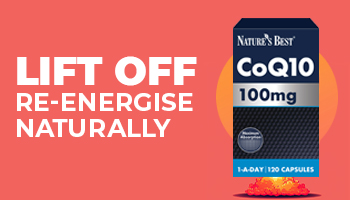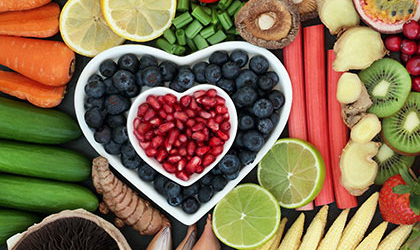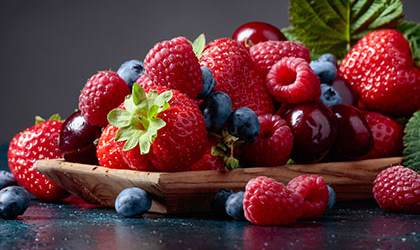
Although widely unknown, CoQ10 is one of the most important nutrients in the body. The human body is made up of trillions of cells and inside almost every cell are thousands of mitochondria. Mitochondria are known as the ‘powerhouse’ of the cell, as they produce the energy the cell needs to function in the form of ATP (Adenosine Triphosphate).
CoQ10, and its active form ubiquinol (pronounced “yoo-bik-win-oll”), is an enzyme that helps produce over 95% of the energy in the cell and is responsible for promoting ATP production in the inner membrane of the mitochondria.
Why do we need CoQ10?
Without the support of CoQ10, the cell is compromised and cannot function correctly, which affects the health of tissues and organs. Just like a car, the cell needs fuel to operate. Inadequate levels of CoQ10 in the mitochondria may cause tiredness and fatigue, and in some cases, trouble concentrating.
Who needs CoQ10?

In short, everyone. CoQ10 is a micronutrient that is at the core of all life processes in the body and is the molecule essential for ATP energy formation. We naturally synthesise CoQ10 in every cell and can obtain low concentrations from dietary sources. However, from around 20 years of age, our natural ability to produce CoQ10 begins to decline.
People with cardiac issues could particularly benefit from CoQ10 and ubiquinol. CoQ10 has been recommended by many practitioners to support heart health. This is because the high energy requirements of muscles — such as the heart muscle — mean that greater concentrations of mitochondria are to be found in muscles and, therefore, CoQ10 and ubiquinol. Increasing your CoQ10 intake could, therefore, help improve energy production in your heart muscle.
What’s the difference between CoQ10 & ubiquinol?
There are two forms of CoQ10:
-
Ubiquinone (CoQ10)
-
Ubiquinol (‘active’ CoQ10)
Both forms of CoQ10 are naturally present in the body, however, our body needs to convert CoQ10 into ubiquinol before it can be used to create energy. This can get harder with age, as the body’s ability to produce CoQ10 and convert it into ubiquinol declines as we get older.
This is why ubiquinol is a popular choice for people over the age of 50. Ubiquinol is coined the ‘body ready’ form of CoQ10, as it requires no conversion — allowing for immediate uptake and fast absorption. For those looking to address established health concerns, ubiquinol is an excellent choice to restore a healthy baseline. Furthermore, ubiquinol is the only known fat-soluble antioxidant made naturally in the body, a unique property not shared by the ubiquinone form of CoQ10.
Ubiquinol can be found in dietary sources such as chicken breasts, avocados and olive oil to name a few. However, you'd have to eat the equivalent of 34 chicken breasts (6oz each) or 60 avocados or 133 tablespoons of olive oil to get anywhere close to a relevant level.
What are the benefits of CoQ10?
Antioxidant properties of ubiquinol
Ubiquinol is one of the most powerful known antioxidants, defending cells from the potentially harmful overaccumulation of free radicals and oxidative stress. Free radicals are created when the body converts food into energy. They can damage cells, protein, DNA. The antioxidant properties in the active form of CoQ10 can help to minimise these negative side effects of energy production.
Antioxidants can support the following areas of health:
-
Skin
-
Teeth & gums
-
Eyes
-
Ageing
-
Immunity
-
Energy
-
Digestions
-
Heart
-
Bones & muscles
-
Cognition
CoQ10 supplements combat the side effects of cholesterol medication
If someone has elevated cholesterol levels, they are usually prescribed statins (cholesterol-lowering drugs) to reduce the risk of developing or having a reoccurring heart health condition.
However, statins can deplete the availability of CoQ10 in the cells. This could explain why it is widely reported that levels of fatigue and tiredness, particularly after exertion, increase in those taking the medication. Many health practitioners recommend CoQ10 supplementation in conjunction with statins to combat the side effects of taking the medication.
Ubiquinol for fertility
Studies conducted into improving sperm quality with supplementation of ubiquinol have revealed encouraging results. As we know, CoQ10/ubiquinol supports energy production in the mitochondria of our cells. As the large mid-section of the sperm cell is a laden core of mitochondria, ubiquinol is essential in getting the sperm cell to its destination. A 26-week double-blind placebo trial showed ubiquinol could help support healthy spermi. The results revealed that sperm quality had increased in the following areas:
-
62% improved sperm count
-
57% increase in mobile sperm
-
52% improvement in normally shaped sperm
References:
-
AUA Journals. (2012). Effects of the Reduced Form of Coenzyme Q10 (Ubiquinol) on Semen Parameters in Men with Idiopathic Infertility: a Double-Blind, Placebo Controlled, Randomized Study. Available online: https://www.auajournals.org/article/S0022-5347(12)03419-2/abstract
You Might Also Like

Keri
Keri Filtness has worked in the Nutrition Industry for 19 years. She is regularly called upon for her professional comments on health and nutrition related news. Her opinions have been featured by BBC3, Prima, Vitality, The Mirror, Woman’s Own and Cycling Weekly, amongst others. She has also worked one to one with journalists, analysing their diets and health concerns and recommending changes and additions, where appropriate.
View More



